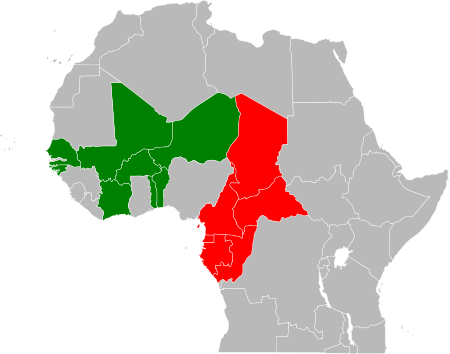
Back فرنك إفريقي Arabic Francu CFA AST AMİ frankı Azerbaijani Франк КФА Byelorussian Франк КФА BE-X-OLD CFA франк Bulgarian Franc CFA Catalan CFA frank Czech CFA-franc Danish CFA franc DAG

West African CFA franc (XOF)
Central African CFA franc (XAF)
The CFA franc (French: franc CFA, [fʁɑ̃ seɛfɑ]) is the name of two currencies used by 210 million people (as of 2023) in fourteen African countries: the West African CFA franc (where "CFA" stands for Communauté Financière Africaine, i.e. "African Financial Community" in English), used in eight West African countries, and the Central African CFA franc (where "CFA" stands for Coopération Financière en Afrique centrale, i.e. "Financial Cooperation in Central Africa" in English), used in six Central African countries.[1] The ISO currency codes are XAF for the Central African CFA franc and XOF for the West African CFA franc. Although the two currencies are commonly called the CFA franc and (currently) have the same value, they are not interchangeable. It is therefore not a common monetary zone but two juxtaposed zones.
Both CFA francs have a fixed exchange rate (peg) to the euro guaranteed by France: €1 = F.CFA 655.957 exactly. To ensure this convertibility guarantee, member countries were required to deposit half of their foreign exchange reserves with the French Treasury, but this requirement was dropped in 2019 (effective in 2021) for the West African CFA franc.[2] This requirement remains unchanged for the Central African CFA franc, which wasn't reformed in 2019 (the reform concerned only the West African CFA franc). The currency has been criticized for restricting the sovereignty of the African member states, effectively putting their monetary policy in the hands of the European Central Bank. Others argue that the CFA "helps stabilize the national currencies of Franc Zone member-countries and greatly facilitates the flow of exports and imports between France and the member-countries".[3]
On 22 December 2019, it was announced that the West African currency would be reformed and replaced by an independent currency to be called Eco.[4] In May 2020, the French National Assembly agreed to end the French engagement in the West African CFA franc, including the foreign reserve deposit requirements, thereby facilitating the transition to the Eco.[5] Despite initial plans for a monetary union by late 2020, setbacks including the COVID-19 pandemic, global geopolitical uncertainties, and failure to meet criteria resulted in a postponement until 2027.[6][7][8][9]
- ^ Nzaou-Kongo, Aubin (2020). "International Law and Monetary Sovereignty. The Current Problems of the International Mastery of the CFA Franc and the Crisis of Sovereign Equality". African Review of Law and Critical Thinking. 1 (1): 25–61. doi:10.6084/m9.figshare.12808835.v3. Retrieved 5 December 2020.
- ^ "A strong currency like the CFA franc makes exports from the CFA-franc zone much more costly than they would ordinarily be and as a result economic growth suffers accordingly. Since most of the countries that use the currency are poor, mostly agricultural economies, this has put a stranglehold on their trade and made them overly dependent upon continuing, privileged access to French and, though them, European markets. That this effectively recreates a quasi-colonial trading relationship between France and its former African colonies that benefits France mightily has not been lost on observers. - See more at: http://afkinsider.com/41946/forex-africa-african-euro/#sthash.bAiuUVxB.dpuf", FOREX Africa: The CFA Franc aka The African Euro, By Jeffrey Cavanaugh AFKI Original Published: 12 February 2014, 02:11pm, http://afkinsider.com/41946/forex-africa-african-euro/#sthash.bAiuUVxB.dpuf
- ^ Economic Integration and Development in Africa, Henry Kyambalesa, Mathurin C. Houngnikpo, p. 88
- ^ "West Africa renames CFA franc but keeps it pegged to euro". Reuters. Archived from the original on 22 December 2019. Retrieved 22 December 2019.
- ^ Cite error: The named reference
:3was invoked but never defined (see the help page). - ^ "West Africa's Eco currency remains an illusion". dw.com. 2 September 2021. Retrieved 6 May 2024.
- ^ "From CFA to ECO: Opportunities and Challenges of Economic and Monetary Cooperation in West Africa" (PDF). policycenter.ma. 1 September 2021. Retrieved 6 May 2024.
- ^ "Challenges to Single Currency Surmountable—Finance Minister Tells West African Leaders". mofep.gov.gh. 18 September 2023. Retrieved 6 May 2024.
- ^ "Is West Africa ready for a single currency?". Brookings. 30 July 2021. Retrieved 6 May 2024.